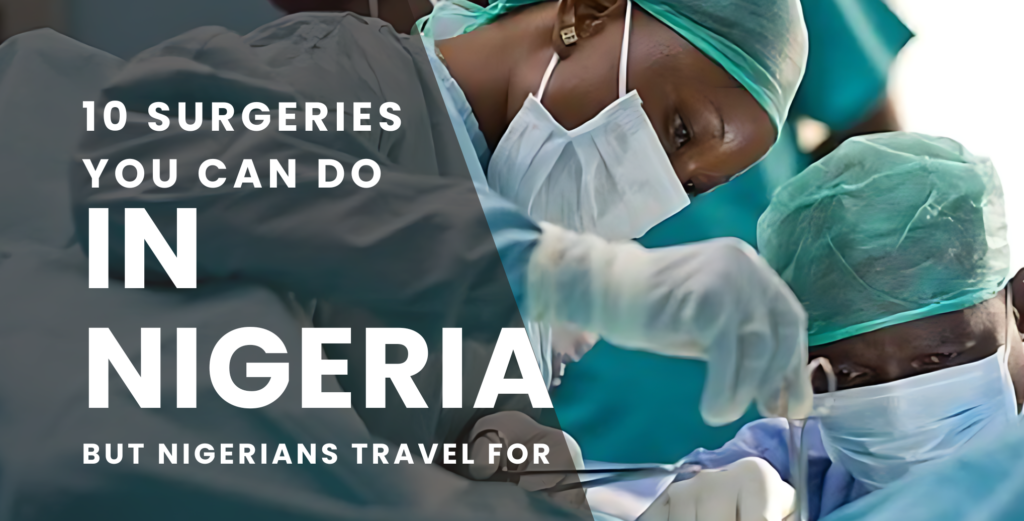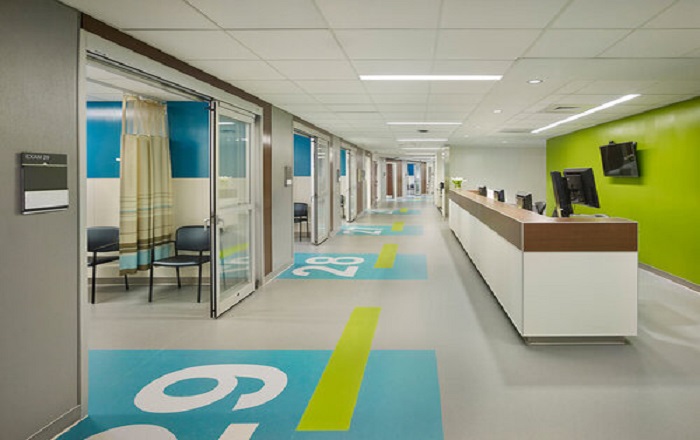10 SURGERIES YOU CAN DO IN NIGERIA BUT NIGERIANS TRAVEL ABROAD FOR
Medical or health tourism is a term known for travel that focuses on medical treatments and healthcare services. Countries such as India, Thailand, United Kingdom, Malaysia, Dubai, and South Africa are among the world’s most prominent medical tourist destinations. The 2020 Global Medical Tourism Index ranks India among the top 10 medical-tourist destinations. Approximately 2 million patients visit India annually from about 78 countries for medical, wellness, and IVF treatments, generating vast development and billions for the country’s medical industry. Nigeria is one of the countries significantly contributing to this statistic, with many Nigerians traveling abroad for various medical procedures.
Several factors drive Nigerians to seek treatment abroad, including perceptions of higher quality care, trust in foreign medical expertise, and the allure of combining treatments with travel. For instance, even with several ear, nose, and throat specialists in Nigeria, the former president traveled to the UK in 2016 for an ear infection. This trend reflects the broader issue of Nigerians seeking treatments abroad despite local availability.
Below are ten surgeries Nigerians can do in Nigeria but often seek abroad.
1. Joint Replacement
Nigerians often travel abroad for advanced prosthetic technology and comprehensive rehabilitation services for hip and knee replacements. These surgeries significantly enhance mobility and quality of life by replacing damaged joints with prosthetics. However, Nigerian orthopedic surgeons have demonstrated their expertise in performing these procedures successfully. For example, in December 2013, senior orthopedic surgeons conducted joint replacement surgeries for six indigent patients in Abuja at no cost. This initiative, organized by the Nigerian Orthopaedic Association, involved Garki Hospital Abuja and National Hospital Abuja, showcasing the high level of competence available locally.
2. Spine Surgery
Complex spine surgeries, such as spinal fusion and disk replacement, demand precision and extensive post-operative care, leading many Nigerians to seek treatment abroad. Despite this trend, Nigerian hospitals have been performing spine surgeries successfully since the first spine surgery in the country in 2005 at the National Orthopaedic Hospital, Dala-Kano. Hospitals like the Federal Medical Centre (FMC) Makurdi, Prime Specialist, Kano and Babcock University Teaching Hospitals have invested in state-of-the-art medical equipment to handle these complex procedures. They have successfully performed numerous spine surgeries, demonstrating their capability and commitment to providing high-quality care.
3. Neurosurgery
Brain surgery requires the expertise of highly skilled neurosurgeons and advanced imaging technology. While many Nigerians opt for neurosurgery abroad, several Nigerian hospitals have proven their ability to perform these delicate procedures. The University College Hospital, Ibadan, Prime Specialist Hospital, Kano, Lagos University Teaching Hospital (LUTH) and Lagos State University Teaching Hospital, Ikeja (LASUTH), are renowned for their neurosurgical capabilities. Wellington Clinics, Abuja performed the country’s first computer-assisted brain surgery in 2016 while Lagos University Teaching Hospital recorded over 400 neurosurgeries in 2018, illustrating the hospital’s proficiency and experience in this field.
4. Complex Orthopedic Surgery
Orthopedic surgery has been a staple of Nigerian medical care since the establishment of the National Orthopaedic Hospital in 1959. Despite this, many Nigerians still travel abroad for orthopedic procedures. In 2022, former Vice President Yemi Osinbajo underwent a femur surgery at Duchess International Hospital, Ikeja, highlighting the competence of local medical facilities. The National Orthopaedic Hospital Igbobi and Lagoon Hospital have successfully performed numerous complex orthopedic surgeries, reinforcing the capabilities of Nigerian healthcare institutions in this field.
5. In Vitro Fertilization (IVF)
Infertility is a significant concern for many Nigerian couples, leading them to seek advanced fertility treatments like in vitro fertilization (IVF) abroad. However, Nigerian hospitals have achieved remarkable success in this area. Life International Hospital in Awka, Anambra State, and Life Specialist Hospital in Nnewi have collectively facilitated the birth of over 500 babies through IVF. Dr. Nwajiaku Louis, head of clinical services at Life International Hospital, encourages couples to seek fertility help locally, emphasizing the effectiveness of the process. Other notable clinics with high IVF success rates include Bridge Clinic, Nordica, St. Ives Specialist Hospital, Nisa Premier, Olan Medical, Lagos, and Alliance Hospital, Abuja.
6. Kidney Transplant
St. Nicholas Hospital, Lagos, was the first in Nigeria to perform successful kidney transplants and has conducted over 500 transplants to date. Lagos State University Teaching Hospital (LASUTH) also completed another kidney transplant in 2016, despite challenges such as a lack of donors. Federal Medical Centre Umuahia performed its 11th kidney transplant in 2023, and Aminu Kano Teaching Hospital (AKTH) celebrated its first kidney transplant using Light Amplification by Stimulated Emission of Radiation (LASER) technology in May 2024. These achievements highlight the advanced capabilities of Nigerian hospitals in performing complex kidney surgeries.
7. Valve Replacement
Heart valve replacement surgeries are critical for patients with damaged heart valves, and many Nigerians seek treatment abroad for this procedure. Nonetheless, Nigerian hospitals are equipped to perform these surgeries. In 2021, the University of Calabar Teaching Hospital successfully performed a mitral valve replacement. Tristate Healthcare Systems, Babcock University Teaching Hospital, and Lagos State Teaching Hospital (LASUTH) have also conducted numerous successful valve replacements, demonstrating their capability in this specialized field.
8. Plastic & Reconstructive Surgery
Plastic and reconstructive surgeries have been performed in Nigeria since 1962 at University College Hospital, Ibadan. Despite this long history, many Nigerians travel abroad for complex plastic surgeries. Jos University Teaching Hospital (JUTH) successfully conducted a 12-hour breast reconstructive surgery for a cancer survivor in 2023. This procedure, led by Prof. Simon Yiltok, aimed to transfer skills to other doctors and reduce the need for medical tourism. The Reddington Hospital Group, Lagos, offers a wide range of aesthetic plastic surgery procedures through its Bodycare Plastic Surgery Clinic, including facelifts, eyelid surgery, breast augmentation and reductions, buttock lifts, body contouring, and Botox treatments.
9. Tumor Resection Surgery
The surgical treatment of tumors requires specialized skills and technology, prompting many Nigerians to travel to countries with renowned centers. However, Nigerian hospitals like Jos University Teaching Hospital (JUTH) have successfully performed complex tumor resections. In an instance, in 2019, JUTH used the Trans-labyrinthine approach to remove a posterior fossa tumor, utilizing the advanced C-Arm machine to navigate the surgery. The C-Arm device, which cost N32 million, allowed surgeons to visualize the skull bone and surrounding structures with precision, offering a cost-effective alternative to traveling abroad.
10. Coronary Artery Bypass Grafting (CABG)
Coronary artery bypass grafting (CABG) is often sought abroad due to its complexity and the need for advanced facilities. This procedure, used to treat severe coronary heart disease, involves bypassing blocked arteries to improve blood flow to the heart. However, Nigerian hospitals have made significant strides in this area. University College Hospital (UCH) Ibadan and Tristate Hospital have performed minimally invasive off-pump CABG, which avoids the use of a heart-lung machine and enables quicker recovery. The Managing Director/CEO of Tristate Hospital, Professor Kamar Adeleke, highlighted that this surgery, which would cost $150,000–$250,000 in the US, is far more affordable in Nigeria and would not need Nigerians to travel out. In 2020, Reddington Multi-specialist Hospital, Lagos, also first successfully conducted a complex heart surgery involving a coronary artery bypass graft.
The advancements in medical technology and the expertise of healthcare professionals in Nigeria have significantly elevated the country’s capacity to perform complex and high-stakes surgeries. Nigerian hospitals have demonstrated great growth potential with their competence and commitment to providing world-class medical care. These facilities not only offer cost-effective alternatives to overseas treatments but also ensure that patients receive high-quality care close to home.
Success stories from institutions like Lagoon Hospitals, Garki Hospital, National Orthopaedic Hospital, University College Hospital, Ibadan, Reddington Hospital, Lagos State University Teaching Hospital, and St. Nicholas Hospital highlight the potential to reduce medical tourism by utilizing local medical expertise and resources. As more Nigerians become aware of their healthcare system’s capabilities, confidence in seeking domestic treatments grows. Key improvements such as upgrading medical infrastructure, enhancing service quality, and promoting public-private partnerships are crucial steps. By reducing reliance on medical tourism and retaining valuable healthcare spending, Nigeria can ensure that more citizens receive high-quality care right at home, fostering national pride in medical achievements and reshaping the narrative around medical tourism.



